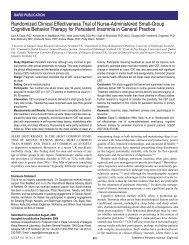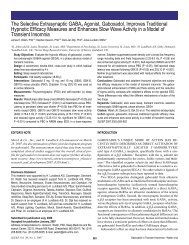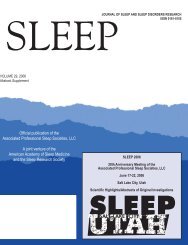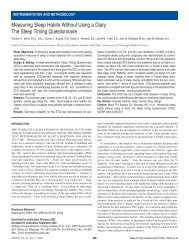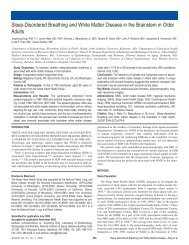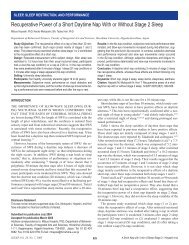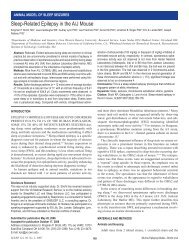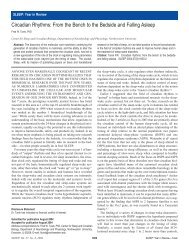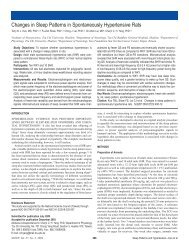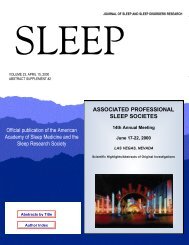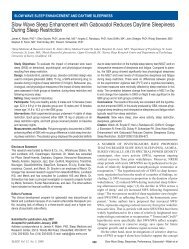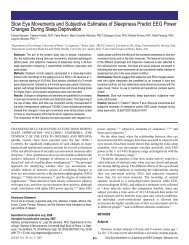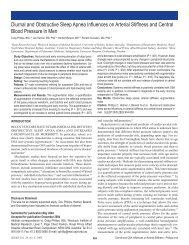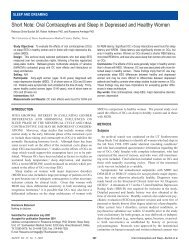SLEEP 2011 Abstract Supplement
SLEEP 2011 Abstract Supplement
SLEEP 2011 Abstract Supplement
You also want an ePaper? Increase the reach of your titles
YUMPU automatically turns print PDFs into web optimized ePapers that Google loves.
B. Clinical Sleep Science VII. Neurological Disorders and Sleep<br />
each pt across naps. Eight had never received any exposure to L-dopa<br />
or DA; 40 received either or both of these drug classes. All underwent<br />
UPDRS; for those receiving L-dopa/DA, ratings were made in “on” condition.<br />
Mean (SD) UPDRS Motor Score = 18.2 (8.1); mean (SD) yrs<br />
diagnosed = 5.8 (3.5).<br />
Results: Groups did not differ in age, sex, or UPDRS, but differed in<br />
yrs since diagnosis (2.1 for never treated vs 6.5 for L-dopa/DA treated,<br />
t = 6.9, p. < .0001). Pts receiving L-dopa/DA fell asleep more quickly<br />
when compared to pts not receiving either medication (20.4 [12.5] mins<br />
vs 31.9 [9.5] mins, t = 2.28, p < .03; effect size d = .98). We then truncated<br />
the former (n = 13) to include only pts with disease duration of 4<br />
yrs or less (maximum duration for L-dopa/DA naive group). UPDRS<br />
scores were equivalent (16.1 vs 16.8, NS), but MWT comparison was<br />
highly statistically significant (p < .005; effect size d = 1.44), suggesting<br />
a highly robust effect, despite smaller sample.<br />
Conclusion: These data suggest that although the degenerative processes<br />
associated with PD may be associated with deficits in alertness,<br />
L-dopa and/or DA contribute to that effect.<br />
Support (If Any): R01 NS-050595; KL RR-025009 (ACTSI)<br />
0639<br />
DIFFERENTIAL ASSOCIATIONS BETWEEN LEVO-<br />
DOPA (L-DOPA) VS DOPAMINE AGONIST (DA) DOSE<br />
AND MAINTENANCE OF WAKEFULNESS TEST (MWT)<br />
MEASURES OF ALERTNESS IN IDIOPATHIC PARKINSON’S<br />
DISEASE (PD)<br />
Bliwise DL, Trotti L, Wilson A, Greer S, Juncos J, Rye DB, Factor SA,<br />
Freeman A, Hollars S, Wood-Siverio C<br />
Neurology, Emory University School of Medicine, Atlanta, GA, USA<br />
Introduction: Medications influencing the dopaminergic system are<br />
suspected to play a role in the sleepiness of PD. In this study, we examined<br />
L-dopa and DA dose-response associations with MWT-defined<br />
alertness.<br />
Methods: PD pts (n = 40) (X age = 64.2, 27 M, 13F) underwent a 48<br />
hr sleep lab protocol of 2 PSG nts followed by 2 days of 4-nap MWT.<br />
MWT duration was held constant at 40 mins; we scored sleep latency<br />
to 3 consecutive epochs of sleep (SLAT3) and obtained means for each<br />
pt across naps. Of the 40 patients, 27 received DA (X pergolide dose<br />
equivalent = 2.6 mg, SD = 1.1) and 33 received L-dopa (X L-dopa daily<br />
dose = 539.4 mg, SD = 264.5) and 20 received both medication classes.<br />
Patients taking L-dopa were significantly older (65.6 vs 57.9, t = 2.09, p<br />
< .05) and those taking DA significantly younger (62.1 vs 68.6, t = 2.19,<br />
p < .04) when compared to pts not taking those medication classes.<br />
Results: Across all 40 patients, higher L-dopa dose was positively correlated<br />
with longer latency to fall asleep SLAT3 (rho = .31, p < .05),<br />
however, higher pergolide equivalent dose was correlated with shorter<br />
latency to fall asleep (rho = -.34, p < .05). Comparisons of patients receiving<br />
only L-dopa (n = 13) and only DA (n = 7) confirmed longer sleep<br />
latencies in the former (23.9 vs 14.1 mins, t = 2.01, p = .059).<br />
Conclusion: These data suggest that the two major classes of medications<br />
used to treat PD patients may have divergent effects on daytime<br />
alertness in this patient population, although preferential age-dependent<br />
patterns of prescribing may confound the effect.<br />
Support (If Any): R01 NS-050595; KL RR-025009 (ACTSI)<br />
0640<br />
PILOT STUDY ON THE EFFECTS OF POOR <strong>SLEEP</strong> ON<br />
EXECUTIVE FUNCTIONING IN ESSENTIAL TREMOR AND<br />
PARKINSON’S DISEASE<br />
Kay D 1 , Jones J 1 , Kirsch-Darrow L 1 , Jordan L 1 , Okun M 2 , Bowers D 1,2<br />
1<br />
Clinical and Health Psychology, University of Florida, Gainesville,<br />
FL, USA, 2 Neurology, University of Florida, Gainesville, FL, USA<br />
Introduction: Beyond motor symptoms, essential tremor (ET) and Parkinson’s<br />
disease (PD) have comparable high levels of executive dysfunc-<br />
tion and sleep complaint. The brain relies on compensatory mechanisms<br />
to maintain cognitive performance following poor sleep. Increased dopamine<br />
and greater cerebellar activity each correlate with better cognitive<br />
performance during sleep loss in healthy adults. A popular hypothesis is<br />
that cerebellar hyperactivity leads to downstream thalamo-cortical dysfunction<br />
in ET. Likewise, ET patients may be cognitively resistant to<br />
poor sleep. Conversely, dopamine depletion and neurologic compromise<br />
in PD may lead to greater cognitive vulnerability to poor sleep.<br />
Methods: The Frontal Systems of Behavior (FrSBe) questionnaire and<br />
Center for Epidemiologic Studies Depression Scale (CES-D) were administered<br />
to a convenience sample of 94 idiopathic PDs and 10 ETs<br />
recruited during routine clinic visits at the UF Movement Disorders<br />
Center. Poor sleep was determined by self-report response to the CES-<br />
D question “Over the last week my sleep was restless?” Patients also<br />
completed the Beck Depression Inventory and the State Anxiety Index<br />
and were included as covariates in a 2(ET vs. PD) x 2(not restless vs.<br />
restless sleep) analysis of covariance (ANCOVA). The dependent variable,<br />
executive functioning, was computed for each participant based<br />
on self-report responses to several FrSBe items and converted to t-score<br />
controlling for age and education.<br />
Results: Analysis revealed a significant interaction, but no main effects,<br />
for neurologic condition and restless sleep, F(1,98)=4.12,p



